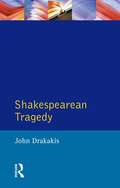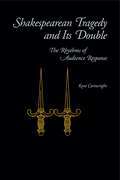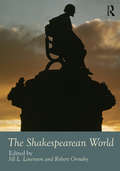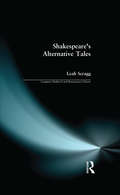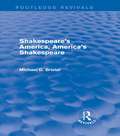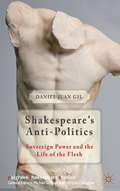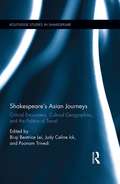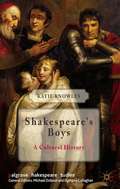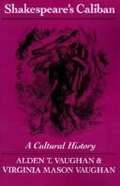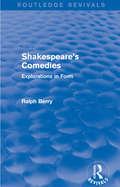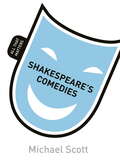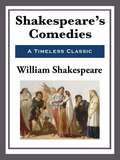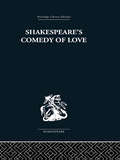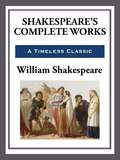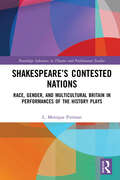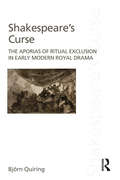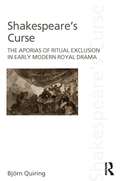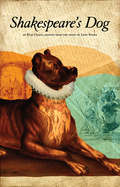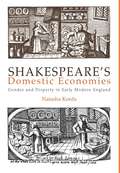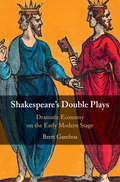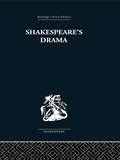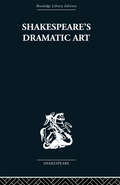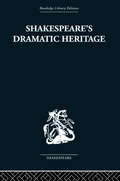- Table View
- List View
Shakespearean Tragedy (Longman Critical Readers)
by John DrakakisShakespearean Tragedy brings together fifteen major contemporary essays on individual plays and the genre as a whole. Each piece has been carefully chosen as a key intervention in its own right and as a representative of an influential critical approach to the genre. The collection as a whole, therefore, provides both a guide and explanation to the various ways in which contemporary criticism has determined our understanding of the tragedies, and the opportunity for assessing the wider issues such criticism raises.The collection begins by considering the impact of social semiotics on approaches to the tragedies, before moving on to deal, in turn, with the various forms of Marxist criticism, New Historicism, Cultural Materialism, Feminism, Psychoanalysis, and Poststructuralism.
Shakespearean Tragedy and Its Double: The Rhythms of Audience Response (G - Reference, Information and Interdisciplinary Subjects)
by Kent CartwrightWhy does Shakespearean tragedy continue to move spectators even though Elizabethan philosophical assumptions have faded from belief? Shakespearean Tragedy and Its Double seeks answers in the moment-by-moment dynamics of performance and response, and the Shakespearean text signals those possibilities.Shakespearean Tragedy and Its Double investigates the poetics of audience response. Approaching tragedy through the rhythms of spectatorial engagement and detachment ("aesthetic distance"), Kent Cartwright provides a performance-oriented and phenomenological perspective. Shakespearean Tragedy and Its Double analyzes the development of the tragic audience as it oscillates between engagement—an immersion in narrative, character, and physical action—and detachment—a consciousness of its own comparative judgments, its doubts, and of acting and theatricality. Cartwright contends that the spectator emerges as a character implied and acted upon by the play. He supports his theory with close readings of individual plays from the perspective of a particular element of spectatorial response: the carnivalesque qualities of Romeo and Juliet; the rhythm of similitude, displacement, and wonder in the audience's relationships to Hamlet; aesthetic distance as scenic structure in Othello; the influence of secondary characters and ensemble acting on the Quarto King Lear; and spectatorship as action itself in Antony and Cleopatra.Shakespearean Tragedy and Its Double treats the dramatic moment in Shakespearean tragedy as uncommonly charged, various, indeterminate, always negotiating unpredictably between the necessary and the spontaneous. Cartwright argues that, for the audience, the very dynamism of tragedy confers a certain enfranchisement, and the spectator's experience emerges as analogous to, though different from, that of the protagonist. Through its own engagement and detachments the audience becomes the final performer creating the play's meaning.
The Shakespearean World (Routledge Worlds)
by Jill L Levenson Robert OrmsbyThe Shakespearean World takes a global view of Shakespeare and his works, especially their afterlives. Constantly changing, the Shakespeare central to this volume has acquired an array of meanings over the past four centuries. "Shakespeare" signifies the historical person, as well as the plays and verse attributed to him. It also signifies the attitudes towards both author and works determined by their receptions. Throughout the book, specialists aim to situate Shakespeare’s world and what the world is because of him. In adopting a global perspective, the volume arranges thirty-six chapters in five parts: Shakespeare on stage internationally since the late seventeenth century; Shakespeare on film throughout the world; Shakespeare in the arts beyond drama and performance; Shakespeare in everyday life; Shakespeare and critical practice. Through its coverage, The Shakespearean World offers a comprehensive transhistorical and international view of the ways this Shakespeare has not only influenced but has also been influenced by diverse cultures during 400 years of performance, adaptation, criticism, and citation. While each chapter is a freshly conceived introduction to a significant topic, all of the chapters move beyond the level of survey, suggesting new directions in Shakespeare studies – such as ecology, tourism, and new media – and making substantial contributions to the field. This volume is an essential resource for all those studying Shakespeare, from beginners to advanced specialists.
Shakespeare's Alternative Tales (Longman Medieval and Renaissance Library)
by Leah ScraggA knowledge of the history and evolution of the tales on which Shakespeare drew in the composition of his plays is essential for the understanding of his work. In re-telling a particular story, a Renaissance writer was not simply reshaping the structure of the narrative but participating in a species of debate with earlier writers and the meanings their tales had accrued. The stories upon which Shakespeare's plays are constructed did not descend to him as innocent collections of incidents, but brought with them considerable cultural baggage, substantially lost to the modern spectator but an essential component, for a contemporary audience, of the meaning of the work.Shakespeare's Alternative Tales explores this literary dialogue, focusing on those plays in which the expectations generated by an inherited story are in some way overthrown, setting up a tension for a Renaissance spectator between 'received' and 'alternative' readings of the text. Each chapter opens with a familiar story, supplying a context for the subsequent discussion, and exhibits the way in which the dramatist's reworking of a traditional motif interrogates the assumptions implicit in his source.While offering the twentieth-century reader a fresh perspective from which to view the plays, the approach also supplies an introduction to contemporary readings of the Shakespearean canon. The tales Leah Scragg considers may be seen as 'alternative' in more than one sense: they radically rework conventional situations, while lending themselves to analysis in terms of new critical methodologies.The text will be of interest to both students of Shakespeare and the general reader. In conjunction with the author's companion volume, Shakespeare's Mouldy Tales, it provides an ideal introduction to contemporary developments in source studies.
Shakespeare's America, America's Shakespeare: Literature, Institution, Ideology In The United States (Routledge Revivals)
by Michael D. BristolFirst published in 1990, this title explores the nature of the interaction between Shakespeare and American culture. Shakespeare stands at the center of an elaborate institutional reality, closely tied to both cultural and ideological production. His plays, Michael Bristol asserts, help to constitute a primary affirmative theme of much American culture criticism, specifically the celebration of individuality and the values of expressive autonomy. This reissue will be of particular value to Literature students and researchers with an interest in Shakespeare, as well as those interested in American cultural history more generally.
Shakespeare’s Anti-Politics
by Daniel Juan GilArgues that Shakespeare is anti-political, dissecting the nature of the nation-state and charting a surprising form of resistance to it, using sovereign power against itself to engineer new forms of selfhood and relationality that escape the orbit of the nation-state. It is these new experiences that the book terms 'the life of the flesh'.
Shakespeare’s Asian Journeys: Critical Encounters, Cultural Geographies, and the Politics of Travel (Routledge Studies in Shakespeare)
by Bi-qi Beatrice Lei Judy Celine Ick Poonam TrivediThis volume gives Asia’s Shakespeares the critical, theoretical, and political space they demand, offering rich, alternative ways of thinking about Asia, Shakespeare, and Asian Shakespeare based on Asian experiences and histories. Challenging and supplementing the dominant critical and theoretical structures that determine Shakespeare studies today, close analysis of Shakespeare’s Asian journeys, critical encounters, cultural geographies, and the political complexions of these negotiations reveal perspectives different to the European. Exploring what Shakespeare has done to Asia along with what Asia has done with Shakespeare, this book demonstrates how Shakespeare helps articulate Asianess, unfolding Asia’s past, reflecting Asia’s present, and projecting Asia’s future. This is achieved by forgoing the myth of the Bard’s universality, bypassing the authenticity test, avoiding merely descriptive or even ethnographic accounts, and using caution when applying Western theoretical frameworks. Many of the productions studied in this volume are brought to critical attention for the first time, offering new methodologies and approaches across disciplines including history, philosophy, sociology, geopolitics, religion, postcolonial studies, psychology, translation theory, film studies, and others. The volume explores a range of examples, from exquisite productions infused with ancient aesthetic traditions to popular teen manga and television drama, from state-dictated appropriations to radical political commentaries in areas including Japan, India, Taiwan, Korea, Indonesia, China, and the Philippines. This book goes beyond a showcasing of Asian adaptations in various languages, styles, and theatre traditions, and beyond introductory essays intended to help an unknowing audience appreciate Asian performances, developing a more inflected interpretative dialogue with other areas of Shakespeare studies.
Shakespeare’s Boys
by Katie KnowlesShakespeare's Boys: A Cultural Historyis the first extensive exploration of boyhood in Shakespeare's plays. It examines a range of characters from Shakespeare's comedies, histories and tragedies in their original early modern contexts and surveys their performance histories on stage and screen from the Restoration until the present day. Focusing on the status of aristocratic boys, the transition from boyhood to manhood and methods of education, it argues that the varied and complex portrayal of boys in Shakespeare reflects the ambiguous and transitional status of boyhood in early modern England, and that the portrayal of these on-stage boys has been a crucial, and sometimes defining, factor in the performance history of Shakespeare's plays. This study embraces this idea of characters in flux, reading Shakespearean boyhood as a continuum in which each historical reincarnation depends upon and reacts against what came before, while influencing what is to come.
Shakespeare's Caliban: A Cultural History
by Alden T. Vaughan; Virginia Mason VaughanShakespeare's Caliban examines The Tempest's "savage and deformed slave" as a fascinating but ambiguous literary creation with a remarkably diverse history. The authors, one a historian and the other a Shakespearean, explore the cultural background of Caliban's creation in 1611 and his disparate metamorphoses to the present time.
Shakespeare's Comedies: Explorations in Form (Routledge Revivals)
by Ralph BerryIn this lucid and original study, first published in 1972, Ralph Berry discusses the ten comedies that run from The Comedy of Errors to Twelfth Night. Berry’s purpose is to identify the form of each play by relating the governing idea of the play to the action that expresses it. To this end the author employs a variety of standpoints and techniques, and taken together, these chapters present a lively and coherent view of Shakespeare’s techniques, concerns, and development. This title will be of interests to students of literature and drama.
Shakespeare's Comedies: All That Matters (Atm Ser.)
by Mike ScottIn Shakespeare's Comedies: All That Matters, Mike Scott explores and explains the secrets that have made Shakespeare's comedies so enduring that they continue to be performed, watched and studied by millions of people every year. Professor Scott focuses in turn on he Comedy of Errors, A Midsummer Night's Dream, Twelfth Night, As You Like It and The Merchant of Venice and builds an argument based around Shakepeare's use of language to prompt the audience's imagination and thought. This original little book, and its companion volume Shakespeare's Tragedies, fills a major gap in the market for a book which will enable readers to understand a Shakesperean play in the context of its ouevre. This accessible and readable book will appeal both to students and general readers, giving a fascinating intoruduction to Shakespeare's comedies - and what matters most about them.
Shakespeare's Comedies
by William ShakespeareA collection containing Alls Well that Ends Well, As You Like It, The Comedy of Errors, Love's Labour's Lost, Measure for Measure, The merry Wives of Windosr, A Midsummer Night's Dream, Much Ado About Nothing, The Taming of the Shrew, The Tempest, Twelfth Night, The Two Gentlemen of Verona, The Winter's Tale, Pericles, and The Two Noble Kinsmen.
Shakespeare's Comedies: All That Matters (All That Matters)
by Michael ScottIn Shakespeare's Comedies: All That Matters, Mike Scott explores and explains the secrets that have made Shakespeare's comedies so enduring that they continue to be performed, watched and studied by millions of people every year. Professor Scott focuses in turn on The Comedy of Errors, A Midsummer Night's Dream, Twelfth Night, As You Like It and The Merchant of Venice and builds an argument based around Shakepeare's use of language to prompt the audience's imagination and thought. This original little book, and its companion volume Shakespeare's Tragedies, fills a major gap in the market for a book which will enable readers to understand a Shakesperean play in the context of its ouevre.This accessible and readable book will appeal both to students and general readers, giving a fascinating intoruduction to Shakespeare's comedies - and what matters most about them."'Comedy is a serious business' says Michael Scott - it is, and his splendid short book takes it very seriously as it should, but remains lively and wonderfully readable withall." Dr Drummond Bone, Master of Balliol College, Oxford"An authoritative and expert overview of the entire fields of Shakespearean Comedy and Tragedy combined with persuasive and eminently accessible close readings of particular plays. Michael Scott brings to the task and infectious enthusiasm and deep knowledge of their theatrical, literary and cultural significance and he provides a clear and compelling endorsement of their continued relevance. These books provide an exemplary introduction to the complex world of Shakespearean drama, full of insights, observations, and ideas, all of which are brought firmly to bear on the abiding question of what these plays mean for us today." John Drakakis, Professor of English at the University of Stirling"Everything is so clear - no academic jargon, for instance. With Shakespeare's Comedies, even the most critical scholars can learn something... as well as students at the start of their encounter with Shakespeare and the same for regular theatre goers. To address all three at once... has to be an accomplishment... from the Introduction to the Conclusion... to the last sentence: (the) reader will readily grasp why this series of books is called All That Matters." Professor M.L.Wine, Evanston, USA
Shakespeare's Comedies of Love
by Karen BamfordBorrowing its title from renowned scholar Alexander Leggatt's landmark 1974 study, Shakespeare's Comedies of Love is a tribute to a critic who has shaped the way the world understands Shakespeare and his comedies. To help celebrate his distinguished career as a teacher and scholar, this collection of essays presents a wide range of new work on the Bard's comedies. The contributors cover diverse areas of inquiry, including the use of the comedies as a source of women's empowerment in nineteenth-century America; civic drama in Elizabethan London; male anxiety about women in the comedies; anti-Semitism in The Merchant of Venice; as well as some key productions of Shakespeare's comedies. Rich in detail and broad in scope, Shakespeare's Comedies of Love is a celebration of Leggatt's distinguished career, and an enduring collection of work on the world's most famous writer.
Shakespeare's Comedy of Love
by Alexander LeggattFirst published in 1987. This study removes some of the critical puzzles that Shakespeare's comedies of love have posed in the past. The author shows that what distinguishes the comedies is not their similarity but their variety - the way in which each play is a new combination of essentially similar ingredients, so that, for example, the boy/girl changes in The Merchant of Venice are seen to have a quite different significance from those in As You Like It.
Shakespeare's Complete Works
by William ShakespeareA balanced editorial approach, a highly respected editor, and comprehensive glosses, footnotes, and historical and cultural essays make this the most reader-friendly introduction to Shakespeare available today. The seventh edition of this comprehensive anthology addresses the two key issues confronted by readers approaching Shakespeare today: a lack of knowledge about the historical period and difficulty with the language of Shakespeare's plays. A richly illustrated general introduction offers insight into Shakespeare's England and background on the literary and cultural contexts in which Shakespeare wrote and produced plays. Each play is introduced by a descriptive essay designed to help the reader appreciate the cultural contexts and interpretive issues raised by the play -- without dictating their interpretations. Thoroughly revised and updated notes and glosses provide additional support to understanding the language of Shakespeare's time.
Shakespeare’s Contested Nations: Race, Gender, and Multicultural Britain in Performances of the History Plays (Routledge Advances in Theatre & Performance Studies)
by L. Monique PittmanShakespeare’s Contested Nations argues that performances of Shakespearean history at British institutional venues between 2000 and 2016 manifest a post-imperial nostalgia that fails to tell the nation’s story in ways that account for the agential impact of women and people of color, thus foreclosing promising opportunities to re-examine the nation’s multicultural past, present, and future in more intentional, self-critical, and truly progressive ways. A cluster of interconnected stage and televisual performances and adaptations of the history play canon illustrate the function that Shakespeare’s narratives of incipient "British" identities fulfill for the postcolonial United Kingdom. The book analyzes treatments of the plays in a range of styles—staged performances directed by Michael Boyd with the Royal Shakespeare Company (2000–2001) and Nicholas Hytner at the National Theatre (2003, 2005), the BBC’s Hollow Crown series (2012, 2016), the RSC and BBC adaptations of Wolf Hall and Bring Up the Bodies (2013, 2015), and a contemporary reinterpretation of the canon, Mike Bartlett’s King Charles III (2014, 2017). This book will be of great interest to scholars and students of Shakespeare, theatre, and politics.
Shakespeare's Curse
by Bjoern QuiringConceptualizing the curse as the representation of a foundational, mythical violence that is embedded within juridical discourse, Shakespeare’s Curse pursues a reading of Richard III, King John, and King Lear in order to analyse the persistence of imprecations in the discourses of modernity. Shakespeare wrote during a period that was transformative in the development of juridical thinking. However, taking up the relationship between theatre, theology and law, Bjoern Quiring argues that the curse was not eliminated from legal discourses during this modernization of jurisprudence; rather, it persisted and to this day continues to haunt numerous speech acts. Drawing on the work of Derrida, Lacan, Walter Benjamin and Giorgio Agamben, among others, Quiring analyses the performativity of the curse, and tracks its power through the juristic themes that are pursued within Shakespeare’s plays – such as sovereignty, legitimacy, succession, obligation, exception, and natural law. Thus, this book provides an original and important insight into early modern legal developments, as well as a fresh perspective on some of Shakespeare’s best-known works. A fascinating interdisciplinary study, this book will interest students and scholars of Law, Literature, and History.
Shakespeare's Curse: The Aporias of Ritual Exclusion in Early Modern Royal Drama
by Björn QuiringConceptualizing the curse as the representation of a foundational, mythical violence that is embedded within juridical discourse, Shakespeare’s Curse:The Aporias of Ritual Exclusion in Early Modern Royal Drama pursues a reading of Richard III, King John, and King Lear in order to analyse the persistence of imprecations in the discourses of modernity. Shakespeare wrote during a period that was transformative in the development of juridical thinking. However, taking up the relationship between theater, theology and law, Björn Quiring argues that the curse was not eliminated from legal discourses during this modernization of jurisprudence; rather, it persisted and to this day continues to haunt numerous speech acts. Drawing on the work of Derrida, Lacan, Walter Benjamin and Giorgio Agamben, among others, Quiring analyses the performativity of the curse, and tracks its power through the juristic themes that are pursued within Shakespeare’s plays – such as sovereignty, legitimacy, succession, obligation, exception, and natural law. Thus, this book provides an original and important insight into early modern legal developments, as well as a fresh perspective on some of Shakespeare’s best known works. A fascinating interdisciplinary study, this book will interest students and scholars of Law, Literature, and History.
Shakespeare's Dog
by Rick ChafeLiving in a wild world full of unpredictable creatures—beasts, beggars, witch hunters, and actors—William's family must find a way to cope with their changing Elizabethan world. With four legs, a keen eye, and a sharp tongue, Hooker, Shakespeare's dog, tells the story of how the Stratford rogue became the world's most famous playwright. Based on the novel by Leon Rooke, Shakespeare's Dog tells the tale of the Bard's life from a unique perspective, showing that in the Elizabethan era, lust, love, and lives collide, and it is anyone's guess who is top dog.
Shakespeare's Domestic Economies: Gender and Property in Early Modern England
by Natasha KordaShakespeare's Domestic Economies explores representations of female subjectivity in Shakespearean drama from a refreshingly new perspective, situating The Taming of the Shrew, The Merry Wives of Windsor, Othello, and Measure for Measure in relation to early modern England's nascent consumer culture and competing conceptions of property. Drawing evidence from legal documents, economic treatises, domestic manuals, marriage sermons, household inventories, and wills to explore the realities and dramatic representations of women's domestic roles, Natasha Korda departs from traditional accounts of the commodification of women, which maintain that throughout history women have been "trafficked" as passive objects of exchange between men.In the early modern period, Korda demonstrates, as newly available market goods began to infiltrate households at every level of society, women emerged as never before as the "keepers" of household properties. With the rise of consumer culture, she contends, the housewife's managerial function assumed a new form, becoming increasingly centered around caring for the objects of everyday life—objects she was charged with keeping as if they were her own, in spite of the legal strictures governing women's property rights. Korda deftly shows how their positions in a complex and changing social formation allowed women to exert considerable control within the household domain, and in some areas to thwart the rule of fathers and husbands.
Shakespeare's Double Plays: Dramatic Economy On The Early Modern Stage
by Brett GamboaIn the first comprehensive study of how Shakespeare designed his plays to suit his playing company, Brett Gamboa demonstrates how Shakespeare turned his limitations to creative advantage, and how doubling roles suited his unique sense of the dramatic. By attending closely to their dramaturgical structures, Gamboa analyses casting requirements for the plays Shakespeare wrote for the company between 1594 and 1610, and describes how using the embedded casting patterns can enhance their thematic and theatrical potential. Drawing on historical records, dramatic theory, and contemporary performance this innovative work questions received ideas about early modern staging and provides scholars and contemporary theatre practitioners with a valuable guide to understanding how casting can help facilitate audience engagement. Supported by an appendix of speculative doubling charts for plays, illustrations, and online resources, this is a major contribution to the understanding of Shakespeare's dramatic craft.
Shakespeare's Drama
by Una Ellis-FermorFirst published in 1980. This collection of essays by the first General Editor of the New Arden Shakespeare brings together the best of Ellis-Fermor's Shespearean criticism, in addition to outstanding essays on Coriolanus and Troilus and Cressida. Collected and edited by Kenneth Muir, the book is prefaced by an appreciation of Ellis-Fermor's work.
Shakespeare's Dramatic Art: Collected Essays
by Wolfgang ClemenFirst published in 1972. Studying Shakespeare's 'art of preparation', this book illustrates the relationship between the techniques of preparation and the structure and theme of the plays. Other essays cover Shakespeare's use of the messenger's report, his handling of the theme of appearance and reality and the basic characteristics of Shakespearian drama.
Shakespeare's Dramatic Heritage: Collected Studies in Mediaeval, Tudor and Shakespearean Drama
by Glynne WickhamShakespeare's Dramatic Heritage shows that the drama of Elizabethan and Jacobean England is deeply indebted to the religious drama of the Middle Ages and represents a climax, in secular guise, to mediaeval experiment and achievement rather than a new beginning. This is fully examined in terms of dramatic literature as well as in terms of theatres, stages and production conventions. The plays studied include: Richard II, A Midsummer Night's Dream, Hamlet, Macbeth, Coriolanus, The Winter's Tale and Marlowe's King Edward II.
